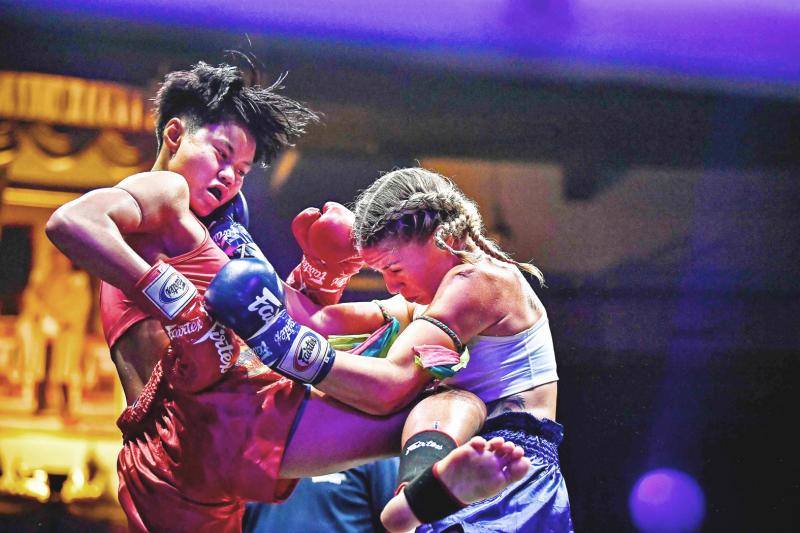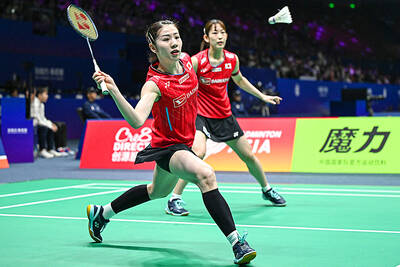Out with the gamblers and harsh neon lights, in with female fighters and fancy lasers — after a 20-month break because of COVID-19, Muay Thai’s spiritual home is embarking on a revolution.
On fight days before the COVID-19 pandemic, thousands of passionate fans would pack Bangkok’s Lumpinee Stadium — the symbolic heart of the ancient art of Muay Thai.
It was not just admiration for the fighters’ skill that drew the crowds: On big days more than US$1million could change hands in bets, in a country where gambling is largely illegal.

Photo: AFP
Then, in March last year, everything came to a halt as Thailand’s first COVID-19 outbreak was traced back to the stadium, which was immediately closed.
Rather than throw in the towel, the stadium owners — the Royal Thai Army — said they have bounced back off the canvas to turn the enforced break into an opportunity.
Major General Ronnawut Ruangsawat, deputy chief of the stadium, said that the grand old arena was “taking advantage of the pandemic to revolutionize itself.”
“The arena has been completely renovated, betting is now prohibited and women are allowed to fight,” he said.
Gone are the harsh neon lights that once bathed the ring in an unforgiving white glare, and fighter Sitthichoke Kaewsanga on Saturday stepped into the ring under a shower of ultra-modern red and silver lasers. Behind him, giant state-of-the-art screens previewed the bout with pictures of the 21-year-old and details of his record.
The stands were empty of fans and much had changed, but the hooks, jabs and knee strikes were the same, as was the backdrop of traditional Thai music played by a live band.
Lumpinee is to welcome fans back in January, albeit with a greatly reduced capacity and strict virus-prevention rules.
Betting is to be off the cards because the army decided it “led to too much cheating, with players sometimes being paid to lose the fight,” Ronnawut said. “We want to clean up the sport, and we hope that other venues in Thailand will follow.”
However, industry professionals are skeptical the army’s good intentions will succeed.
“They will continue to bet online — gambling is part of the Muay Thai DNA,” World Muay Thai Organization secretary-general Jade Sirisompan said.
“Many gamblers, among them many gym owners, make a living from it and can pocket thousands of dollars on a good day,” Sirisompan said. “They are not going to give it up.”
No less revolutionary is the decision to allow female fighters to take part in bouts at Lumpinee’s main arena.
For years, women — including fans — were banned from even touching the ring because of a superstition that their menstruating bodies might break the magic protecting it.
Other venues have accepted female fighters for some time, but Lumpinee — the sport’s equivalent of Lord’s in cricket or soccer’s Wembley Staduim — held out.
After a low-profile bout in a backroom in September, two women competed in the main ring for the first time on Saturday.
After beating Australia’s Celest Muriel Hansen, 21-year-old Thai fighter Kullanat Ornok said: “We are so proud to have been the first women to fight here. We’ve been fighting for more equality for years.”
“We have come such a very long way. This was so much more than just a fight,” 27-year-old Hansen said.
For Kullanat, getting back in the ring to earn money after the long break was just as important.
“I hadn’t fought in almost a year. I used to earn US$100 a match, then nothing for months to support my family,” Kullanat said.
Deprived of bouts because of the pandemic, thousands of professional boxers — men and the much smaller number of women fighters — returned to their villages.
After so long away from the grueling daily training regime the sport demands, many will never make it back to the same level and the government has offered no financial support.
Many fighters had no choice but to take side jobs.
Sitthichoke became a rider for a delivery service.
His five-round victory in Saturday’s bout earned him less than US$1,000. Before the pandemic he could earn triple that.
Perhaps inevitably for a venue seen as a bastion of tradition, the changes have not gone down well with everyone.
“We don’t recognize anything. The Muay Thai temple has become a big showroom,” Sirisompan said after watching a broadcast of the matches. “It has lost its soul.”

Japanese badminton star Chiharu Shida on Tuesday told Chinese fans to “stop stalking” her, adding that she was “very scared” by the unwanted attention. Shida, who won women’s doubles bronze at the Paris Olympics last year, has a strong following in China partly because of her engagement with the local culture. The 27-year-old, currently competing at the Badminton Asia Championships in Ningbo, China, has been dubbed the “Badminton Goddess” by fans and media. She hit out at some supporters on Tuesday, accusing them in an Instagram post of taking their fandom too far. “Every time we compete in China we always experience the harm

Paris Saint-Germain (PSG) have shown the team do not need star power to win trophies and with the French Ligue 1 title won with six games to spare, the French champions would look to finish the season without losing, manager Luis Enrique said on Saturday. A 1-0 victory over Angers SCO at the Parc des Princes helped PSG win their fourth straight Ligue 1 title and a record-extending 13th overall. PSG can still break Nantes’ 30-year-old record of 32 games unbeaten. Although Nantes lost one game en route to the title, no French club has ever gone an entire league

THREES KINGS: The Celtics claimed a piece of league history by setting a new record for the number of threes in a season, ending their game with 1,370 Jalen Green and Alperen Sengun on Friday combined for 65 points as the Houston Rockets halted Oklahoma City’s 11-game winning streak with a statement 125-111 victory. In a potential Western Conference finals preview, the Rockets produced a dominant all-round performance to jolt the top-seeded Thunder’s all-conquering preparations for the post-season. Green finished with 34 points from 11-of-24 shooting, while Turkish big man Sengun made 31 points as second-placed Houston improved to 51-27. Oklahoma City grabbed the lead in the opening minutes of the first quarter, but Houston soon knocked the Thunder out of their stride with a physical approach to move into the

Saudi Arabia’s Public Investment Fund (PIF) has failed in an attempt to persuade the PGA Tour to deliver serious concessions in exchange for a US$1.5 billion investment, leaving elite golf no closer to reconciliation just days from the season’s first major. The PGA Tour’s stance would give credence to the rising sense that the organization has increasing confidence in its position after a turbulent period caused by the formation of the Saudi-backed LIV Tour. Sources indicate that in correspondence sent to the PGA Tour last week, PIF sought assurances that the LIV circuit could continue to operate and that PIF governor Yasir